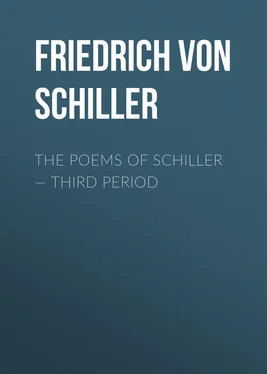Friedrich Schiller - The Poems of Schiller — Third period
Здесь есть возможность читать онлайн «Friedrich Schiller - The Poems of Schiller — Third period» — ознакомительный отрывок электронной книги совершенно бесплатно, а после прочтения отрывка купить полную версию. В некоторых случаях можно слушать аудио, скачать через торрент в формате fb2 и присутствует краткое содержание. Жанр: literature_18, Поэзия, foreign_antique, foreign_prose, foreign_poetry, на английском языке. Описание произведения, (предисловие) а так же отзывы посетителей доступны на портале библиотеки ЛибКат.
- Название:The Poems of Schiller — Third period
- Автор:
- Жанр:
- Год:неизвестен
- ISBN:нет данных
- Рейтинг книги:3 / 5. Голосов: 1
-
Избранное:Добавить в избранное
- Отзывы:
-
Ваша оценка:
- 60
- 1
- 2
- 3
- 4
- 5
The Poems of Schiller — Third period: краткое содержание, описание и аннотация
Предлагаем к чтению аннотацию, описание, краткое содержание или предисловие (зависит от того, что написал сам автор книги «The Poems of Schiller — Third period»). Если вы не нашли необходимую информацию о книге — напишите в комментариях, мы постараемся отыскать её.
The Poems of Schiller — Third period — читать онлайн ознакомительный отрывок
Ниже представлен текст книги, разбитый по страницам. Система сохранения места последней прочитанной страницы, позволяет с удобством читать онлайн бесплатно книгу «The Poems of Schiller — Third period», без необходимости каждый раз заново искать на чём Вы остановились. Поставьте закладку, и сможете в любой момент перейти на страницу, на которой закончили чтение.
Интервал:
Закладка:
If half with death the germs may sleep,
Yet half with life they share the beams;
My heralds from the dreary deep,
Soft voices from the solemn streams, —
Like her, so them, awhile entombs,
Stern Orcus, in his dismal reign,
Yet spring sends forth their tender blooms
With such sweet messages again,
To tell, — how far from light above,
Where only mournful shadows meet,
Memory is still alive to love,
And still the faithful heart can beat!
Joy to ye children of the field!
Whose life each coming year renews,
To your sweet cups the heaven shall yield
The purest of its nectar-dews!
Steeped in the light's resplendent streams,
The hues that streak the Iris-bow
Shall trim your blooms as with the beams
The looks of young Aurora know.
The budding life of happy spring,
The yellow autumn's faded leaf,
Alike to gentle hearts shall bring
The symbols of my joy and grief.
THE ELEUSINIAN FESTIVAL
Wreathe in a garland the corn's golden ear!
With it, the Cyane 17 17 The corn-flower.
blue intertwine
Rapture must render each glance bright and clear,
For the great queen is approaching her shrine, —
She who compels lawless passions to cease,
Who to link man with his fellow has come,
And into firm habitations of peace
Changed the rude tents' ever-wandering home.
Shyly in the mountain-cleft
Was the Troglodyte concealed;
And the roving Nomad left,
Desert lying, each broad field.
With the javelin, with the bow,
Strode the hunter through the land;
To the hapless stranger woe,
Billow-cast on that wild strand!
When, in her sad wanderings lost,
Seeking traces of her child,
Ceres hailed the dreary coast,
Ah, no verdant plain then smiled!
That she here with trust may stay,
None vouchsafes a sheltering roof;
Not a temple's columns gay
Give of godlike worship proof.
Fruit of no propitious ear
Bids her to the pure feast fly;
On the ghastly altars here
Human bones alone e'er dry.
Far as she might onward rove,
Misery found she still in all,
And within her soul of love,
Sorrowed she o'er man's deep fall.
"Is it thus I find the man
To whom we our image lend,
Whose fair limbs of noble span
Upward towards the heavens ascend?
Laid we not before his feet
Earth's unbounded godlike womb?
Yet upon his kingly seat
Wanders he without a home?"
"Does no god compassion feel?
Will none of the blissful race,
With an arm of miracle,
Raise him from his deep disgrace?
In the heights where rapture reigns
Pangs of others ne'er can move;
Yet man's anguish and man's pains
My tormented heart must prove."
"So that a man a man may be,
Let him make an endless bond
With the kind earth trustingly,
Who is ever good and fond
To revere the law of time,
And the moon's melodious song
Who, with silent step sublime,
Move their sacred course along."
And she softly parts the cloud
That conceals her from the sight;
Sudden, in the savage crowd,
Stands she, as a goddess bright.
There she finds the concourse rude
In their glad feast revelling,
And the chalice filled with blood
As a sacrifice they bring.
But she turns her face away,
Horror-struck, and speaks the while
"Bloody tiger-feasts ne'er may
Of a god the lips defile,
He needs victims free from stain,
Fruits matured by autumn's sun;
With the pure gifts of the plain
Honored is the Holy One!"
And she takes the heavy shaft
From the hunter's cruel hand;
With the murderous weapon's haft
Furrowing the light-strown sand, —
Takes from out her garland's crown,
Filled with life, one single grain,
Sinks it in the furrow down,
And the germ soon swells amain.
And the green stalks gracefully
Shoot, ere long, the ground above,
And, as far as eye can see,
Waves it like a golden grove.
With her smile the earth she cheers,
Binds the earliest sheaves so fair,
As her hearth the landmark rears, —
And the goddess breathes this prayer:
"Father Zeus, who reign'st o'er all
That in ether's mansions dwell,
Let a sign from thee now fall
That thou lov'st this offering well!
And from the unhappy crowd
That, as yet, has ne'er known thee,
Take away the eye's dark cloud,
Showing them their deity!"
Zeus, upon his lofty throne,
Harkens to his sister's prayer;
From the blue heights thundering down,
Hurls his forked lightning there,
Crackling, it begins to blaze,
From the altar whirling bounds, —
And his swift-winged eagle plays
High above in circling rounds.
Soon at the feet of their mistress are kneeling,
Filled with emotion, the rapturous throng;
Into humanity's earliest feeling
Melt their rude spirits, untutored and strong.
Each bloody weapon behind them they leave,
Rays on their senses beclouded soon shine,
And from the mouth of the queen they receive,
Gladly and meekly, instruction divine.
All the deities advance
Downward from their heavenly seats;
Themis' self 'tis leads the dance,
And, with staff of justice, metes
Unto every one his rights, —
Landmarks, too, 'tis hers to fix;
And in witness she invites
All the hidden powers of Styx.
And the forge-god, too, is there,
The inventive son of Zeus;
Fashioner of vessels fair
Skilled in clay and brass's use.
'Tis from him the art man knows
Tongs and bellows how to wield;
'Neath his hammer's heavy blows
Was the ploughshare first revealed.
With projecting, weighty spear,
Front of all, Minerva stands,
Lifts her voice so strong and clear,
And the godlike host commands.
Steadfast walls 'tis hers to found,
Shield and screen for every one,
That the scattered world around
Bind in loving unison.
The immortals' steps she guides
O'er the trackless plains so vast,
And where'er her foot abides
Is the boundary god held fast;
And her measuring chain is led
Round the mountain's border green, —
E'en the raging torrent's bed
In the holy ring is seen.
All the Nymphs and Oreads too
Who, the mountain pathways o'er,
Swift-foot Artemis pursue,
All to swell the concourse, pour,
Brandishing the hunting-spear, —
Set to work, — glad shouts uprise, —
'Neath their axes' blows so clear
Crashing down the pine-wood flies.
E'en the sedge-crowned God ascends
From his verdant spring to light,
And his raft's direction bends
At the goddess' word of might, —
While the hours, all gently bound,
Nimbly to their duty fly;
Rugged trunks are fashioned round
By her skilled hand gracefully.
E'en the sea-god thither fares; —
Sudden, with his trident's blow,
He the granite columns tears
From earth's entrails far below; —
In his mighty hands, on high,
Waves he them, like some light ball,
And with nimble Hermes by,
Raises up the rampart-wall.
But from out the golden strings
Lures Apollo harmony,
Measured time's sweet murmurings,
And the might of melody.
The Camoenae swell the strain
With their song of ninefold tone:
Captive bound in music's chain,
Softly stone unites to stone.
Интервал:
Закладка:
Похожие книги на «The Poems of Schiller — Third period»
Представляем Вашему вниманию похожие книги на «The Poems of Schiller — Third period» списком для выбора. Мы отобрали схожую по названию и смыслу литературу в надежде предоставить читателям больше вариантов отыскать новые, интересные, ещё непрочитанные произведения.
Обсуждение, отзывы о книге «The Poems of Schiller — Third period» и просто собственные мнения читателей. Оставьте ваши комментарии, напишите, что Вы думаете о произведении, его смысле или главных героях. Укажите что конкретно понравилось, а что нет, и почему Вы так считаете.











